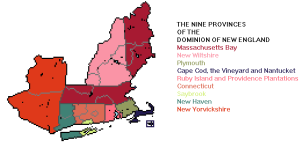
The
Dominion of New England's
Grand Council is made out of two chambers, one of which provides confidence for the Captain-Minister (the local equivalent of a Prime Minister), and the other which acts as a chamber of scrutiny, of review and ultimately of the veto.
The Captain-Minister answers to the Governor, appointed by the King over in Britain, and to the
House of Laity, the lower chamber. It is a popularly-elected chamber, answerable to those of some property. Once, it was long ago built off 'church suffrage' where any registered member of a church who was regarded as in good standing would be automatically enfranchised, but with the secular reforms imposed by the Imperium, this was tightened up to be more strictly those of provable property, not just church-going people.
The upper chamber was once the
House of Clergy, elected religious ministers by their fellows from each of the provinces, and arguably was the more 'senior' chamber in the old system, as it often overrode the House of Laity on policy. The Imperium intervened eventually, imposing a government structure that at least obeyed the pretence of secularism, and the House of Clergy was abolished, replaced by the
House of Estimate, with an equal number of Estimators being appointed by each provincial assembly. This blatantly unrepresentative model is arguably more unbalanced compared to the previous House, where even though suffrage was deeply restricted, it at least reflected, roughly, the population.
The 'factions' in the House of Laity, and to a lesser degree the House of Estimate, goes as such.
The
Whigs: Very secular, reformist but not democratic. They're willing to admit
some fault, and would like to reform the House of Estimate to be a little more based on population, but shies away from full on population-basis due to the small provinces having a strong say in Whig caucus rooms.
The
Covenanters: Quite religious, very hierarchical, somewhat reactionary. Their distrust of the secular system and of the House of Estimate is well known, and they often think of a way to restore the rightful House of Clergy. All of their appointments to the House of Estimate are clergymen.
The
Commonwealthmen: Very religious, but firmly not hierarchical. They believe in a "Godly Republic", and prior to their going full-blown revolutionary were known as the troublemakers in the Laity, and never got representation in the Estimate, for that reason.
The
Natives: The many
many protectorates in the Dominion of New England are all permitted to send a 'delegate' to the House of Laity. They tend mostly cautious, distrustful of the Commonwealthmen's talk of 'uniformity', balk at Covenanters' overt missionary views and loosely work with Whigs.



